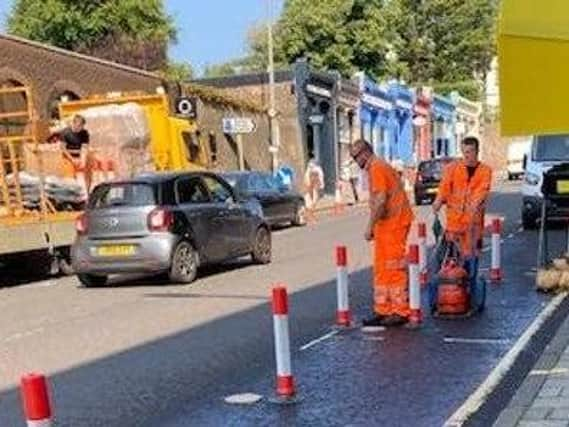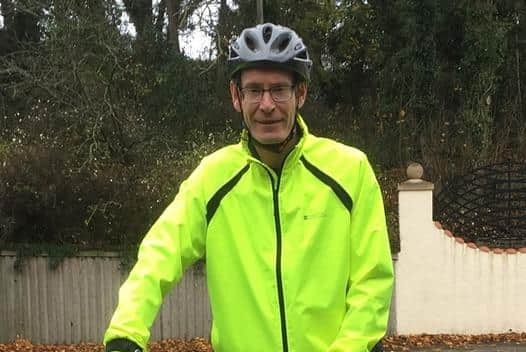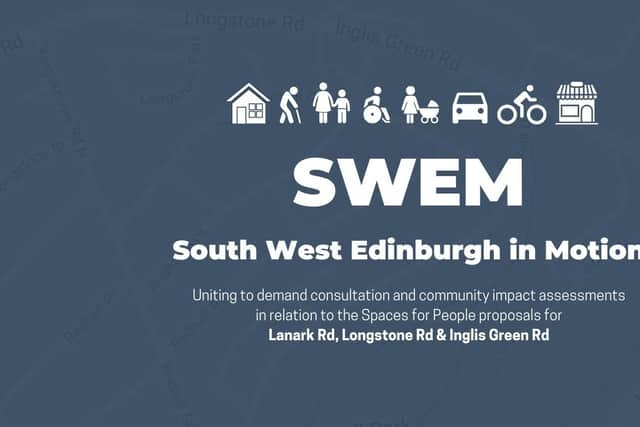Council embroiled in legal row with local group over Edinburgh's Spaces for People scheme


South West Edinburgh in Motion (SWEM) is a campaign group set up to represent local residents and businesses, whether active travellers or motorists, in response to the council’s use of emergency powers to push through controversial traffic measures.
SWEM had provided the council with legal advice from a QC that said that their use of a TTRO is unlawful.
Advertisement
Hide AdAdvertisement
Hide AdBut the council has responded by rejecting the groups legal claims citing guidance that was issued by Transport Scotland in April 2020.


An element of the guidance issued by Transport Scotland in April 2020, said: “The Scottish government is clear that the incidence of coronavirus (Covid-19) is a danger to the public and there remains an ongoing likelihood of transmission in the community while public health measures are in place.”
“The Scottish government, in consideration of the observed rise in walking and cycling while public health measures are in place and the necessity of maintaining physical distancing, is supportive of local authorities considering whether it may be appropriate to make adaptations to their road network, such as closing some roads to certain vehicles or reallocating road space to pedestrians and cyclists.”
“The physical distancing measures that we are asking everyone to undertake, for public safety reasons, have an impact on the amount of safe walking/cycling space required. This may particularly be the case where there are increases in numbers of pedestrians and cyclists all requiring to observe physical distancing. Changes to road space allocation and other temporary measures may need to be considered while Scotland is working to slow the transmission of coronavirus.”
Advertisement
Hide AdAdvertisement
Hide AdSWEM has hit back by saying that they are confident in their legal position.


They added that the above guidance is outdated and belongs to a period where it was less understood as to how the Covid-19 virus was transmitted.
As a result the group is calling for the Scottish government to urgently review their “outdated transport guidance.”
Professor Derryck Reid, chair of SWEM, is concerned that absence of safety audits and recognition of vulnerable groups is partly because the council is relying heavily on Scottish government guidance issued by Transport Scotland nearly a year ago.
Advertisement
Hide AdAdvertisement
Hide AdHe said: “The council is basing decisions on guidance issued only weeks into the pandemic, when there was less understanding and evidence of how COVID was spreading, there was genuine fear of ‘pinch points’ preventing physical distancing if movement of people returned to pre-lockdown levels. There was also a desire to support a short-lived increase in leisure cycling due to the warmest and driest weather Scotland has seen for some time.
“However, there are many things that have changed since, then such as understanding that COVID transmission is predominantly indoors in gatherings with poor ventilation, not in low footfall outdoor spaces. Data gathering around official categories of transmission reflects this.”
“In Edinburgh, segregated cycle lanes exclude many people with mobility issues, and their carers, from accessing 39 km of kerbside parking. We do not believe that this level of disability discrimination is what this application of TTROs set out to do.
“Specific to our scheme, concerns about floating parking for this scheme have been raised by expert organisations such as the Edinburgh Access Panel, and then dismissed by the Council. An independent survey of over 1,000 local people, showed that 89 percent did not want this for our area.”
Advertisement
Hide AdAdvertisement
Hide AdThe council has disputed this claim, saying that an integrated impact assessment was carried out late last year and that their proposals were supported by various organisations and stakeholders including the Edinburgh Access Panel.
Derryck continued: “More disappointingly, these TTROs have failed to succeed in one of their aims of increasing cycling. Transport Scotland COVID Transport Trend Data, shows a 30 percent drop in cycling year-on-year since 31 August 2020 in spite of the £30m plus spent on temporary cycle lanes so far.
“We are calling on the Scottish government to urgently review this guidance, to reflect the fast-changing situation and new data available. This is vital to avoid unintended harmful consequences for all road users, particularly vulnerable road users, as well as directly impacted residents and businesses already struggling during this pandemic.
“In the meantime, we remain confident of our legal position and intend to progress on that basis.”
Advertisement
Hide AdAdvertisement
Hide AdThe council has said that they feel it is absolutely necessary to install the traffic measures that are set to be implemented on January 25.
They added that their own data points to a trend of more residents choosing to actively travel during the pandemic.
Transport and environment convener, Councillor Lesley Macinnes, said: “We are confident that these measures are necessary for protecting public health and providing safe routes for people making essential journeys by foot, bike or wheelchair, as per guidance from Transport Scotland.
“These emergency measures will not only provide a safer environment for people walking, cycling and wheeling on Lanark Road, Longstone Road and Inglis Green Road but will offer an alternative route to the Union Canal towpath and Water of Leith walkway. Thanks to a significant increase in walking and cycling these shared use paths are regularly crowded and have become pinch points at narrower sections, so it’s essential that we offer spaces for people to physically distance.”
Advertisement
Hide AdAdvertisement
Hide AdTransport and environment vice convener, Councillor Karen Doran, said: “This scheme is about providing essential, protected routes allowing people to physically distance while walking, cycling and wheeling, in line with powers to introduce emergency measures.
“We have made every effort to listen to the community and have responded by amending the scheme’s design. We’ve heard from people who do want to see it implemented and now work is about to get underway, we’re looking forward to seeing many more benefit from the improvements.”
A message from the Editor:
Thank you for reading this article. We're more reliant on your support than ever as the shift in consumer habits brought about by coronavirus impacts our advertisers.
If you haven't already, please consider supporting our trusted, fact-checked journalism by taking out a digital subscription.
Comment Guidelines
National World encourages reader discussion on our stories. User feedback, insights and back-and-forth exchanges add a rich layer of context to reporting. Please review our Community Guidelines before commenting.